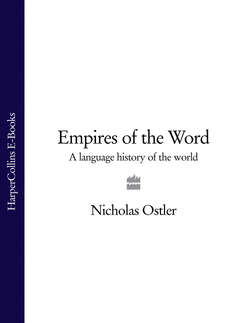Читать книгу Empires of the Word: A Language History of the World - Nicholas Ostler - Страница 33
Final paradoxes
ОглавлениеAs we have seen, Christianity was to put an end to hieroglyphic writing and with it the central stream of ancient Egyptian culture. But despite this it had a last perverse effect, ensuring the long-term survival of the Egyptian language itself. By the third century AD Egyptian had long lost any role in government or elite life, which were now conducted exclusively in Greek. Yet at this very point, the newly rising force of Christians saw the language as the best means to advance the conversion of the Egyptian people. As such, they made it the vehicle of a new sort of literature, in which the Greek alphabet would be used to represent Egyptian. Since the Egyptian language is more complex in its sound system than Greek, six new letters (borrowed from the demotic script) were added: and so the Coptic alphabet was created. The new tradition began with translations of the Bible, then expanded into original compositions, narrating the lives of the Fathers of the Egyptian Desert, St Pachomius and his followers. Coptic became a major channel for the development of the Christian doctrine, with homilies, letters and polemics all widely read in the Egyptian Church.
Egyptian was written in this way for another thousand years. Ironically, it was this late-acquired association with the Christian Church which saved it; by contrast, the lightning spread of Islam and Arabic in the seventh century soon blotted out the language of the previous masters, Greek.
Egyptian, now known as Coptic, had survived the first onslaught; but the threat from Arabic was always more insidious than that from Greek. Islam, after all, was an egalitarian religion; once Arabic was accepted, there were no other bars to social preferment under the new regime. Over the centuries, the fortunes of the Coptic language ebbed with its associated religion. The last great work written in Coptic is the Triadon, a long poem composed shortly after 1300. Even a hundred years later, Christians in Upper Egypt were said to speak little else,13 but it seems that by the end of the sixteenth century Coptic conversation was gone, or almost gone. Its recitation, in the liturgy of the Coptic Church, has lasted to our day.
